
views
X
Research source
Many have lived in Qatar for decades while dutifully renewing their residence permit every year. While a path to citizenship for non-Qatari nationals exists, it is extremely limited. In 2018, the country passed a law to allow permanent residence for the first time to foreign nationals who've lived and worked in the country for at least 20 years.[2]
X
Research source
While permanent resident status isn't required to become a citizen, it's likely easier to become a permanent resident than to become a citizen.[3]
X
Research source
Getting a Visa and Work Permit

Secure a job in Qatar before you apply for your visa. Qatar doesn't offer visas that allow potential immigrants to come into the country and look for work. Many Qatari employers recruit internationally so you can complete the hiring process in your home country. International job fairs and industry publications can help you find work with a Qatari employer. You can also look up employers that interest you and see if they have job openings posted on their website. Since the vast majority of the Qatari workforce is made up of foreign nationals, you don't have to worry about Qatari employers not being familiar with the process.

Work with your employer to complete your application. Your employer handles all the paperwork necessary to get your temporary visa to enter Qatar, but they'll need some information from you to fill out all the paperwork properly. Provide any documents they ask for as soon as possible to ensure that the process goes as quickly and smoothly as possible. When your employer submits your application, give them your passport so your temporary visa can be placed inside. This allows you to enter Qatar and start working for your employer. The government doesn't provide any information regarding how long it takes to get this temporary visa, but it will be available by the date your employer has set for you to start.
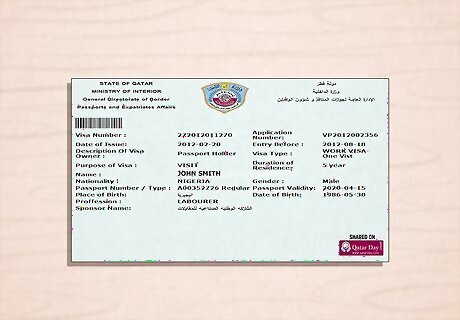
Get your temporary visa converted into a work permit after you arrive. As with your temporary visa, your employer also handles this process. They'll submit the documentation necessary to convert your visa after you start working for them in Qatar. This process typically takes 2-4 weeks. You can't leave Qatar for any reason until the conversion process is complete. Once you have a work permit, you can sign contracts (including lease contracts to rent a home) in Qatar, as well as apply for a loan. You also need this permit to be eligible for other licenses or permits you might need for your job.

Sponsor your immediate family to join you in Qatar. With a work residence permit, you can personally sponsor your immediate family (spouse and dependent children) so they can live in Qatar with you. Every member of your family, including infants, must have a valid passport and visa. Provide documents to the Ministry of Interior so they can process the application, such as birth certificates and your marriage certificate. The Ministry will tell you exactly what documents you need. Get a letter from your employer stating that they don't object to your family joining you. They'll also provide salary information so you can prove that you earn enough money to support your family in Qatar.
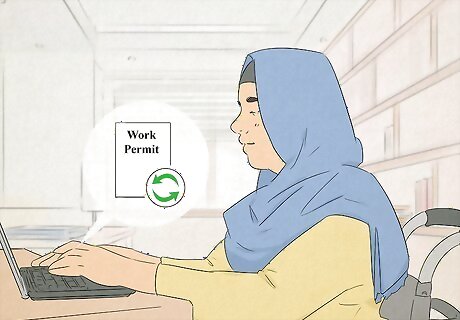
Renew your work residence permit every year. Your employer will make sure that your work residence permit is renewed each year before it expires. If your permit isn't renewed, you must immediately leave the country, which could potentially jeopardize your eligibility for permanent resident status. If you switch to a new employer, go online and change your work residence permit to reflect a new sponsor. You'll need a copy of the new employment contract.
Becoming a Permanent Resident

Live in Qatar legally and continuously for at least 20 years. While you're living in Qatar, you are allowed to leave the country. However, you can't be gone for more than 60 days a year during the 20-year period if you want to apply for permanent resident status. If you were born in Qatar and subsequently moved abroad and got citizenship in another country, you only have to live in Qatar for 10 years before you can apply for permanent residence status.

Make enough money to cover expenses for you and your family. Your employer will certify your wages or salary for your application. The Emir's cabinet sets a minimum amount each year that you have to make to be eligible for permanent residency, although this minimum amount isn't published. Your regular work residence permit wouldn't be approved if you weren't making enough to support yourself and your family, so, in theory, you shouldn't have any trouble meeting this requirement. However, the Qatar government hasn't indicated whether the amount of income required for permanent residency will be more than the amount required for the regular work residence permit.

Follow Qatari law and maintain a good reputation. Immigration officials pay particularly close attention to any violation of laws related to honesty and morality. These offenses likely include violation of laws related to honoring and respecting Islam. If you do happen to have any convictions, you might still be eligible for permanent residency if you can prove that you've been successfully rehabilitated under Qatari law. Unfortunately, the law itself doesn't specify what proof you need to provide of your successful rehabilitation.

Acquire basic conversational skills in Arabic. You don't have to be fluent in Arabic to become a permanent resident, but the law does say you should have "sufficient knowledge." Interpret this to mean that you should be able to read and write enough Arabic to get along in life and at work, as well as carry on basic conversations. Even though most Qataris speak English, if you've lived in Qatar for 20 years, it's likely that you've learned enough of the language through immersion to meet this requirement.
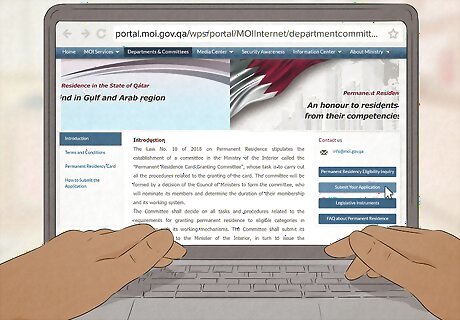
Submit your initial application through the website of the Ministry of Interior. On the website, click "electronic services," then select "Resident Service" and choose "Permanent Residence Card." Follow the instructions to submit your application. To submit your application online, you must have a smart ID card with e-services activated, as well as a smart card reader that you can attach to your computer. When you submit your application, pay the non-refundable application fee of QR 3000. This fee covers applications for you and all of your family members. The Ministry processes your initial application based on the information already in your file.
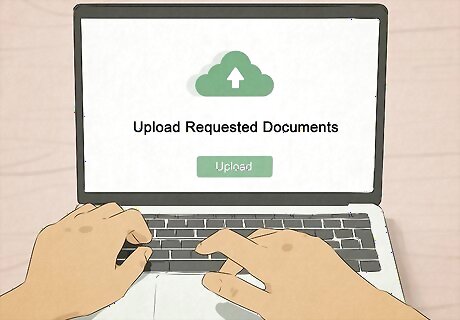
Upload documents requested by the Ministry. The Ministry will send you an email notification with a list of documents to upload. Scan the documents you need so you can upload your digital copies to the system. Generally, you'll need documents to verify various information, such as your employment, salary, and criminal background. Your employer can help you get the documents you need if you're not sure how to proceed. You'll likely also need documents to prove your identity, including a copy of your passport. If other family members are included on your application, you'll need documents to prove your relationships to them, such as a marriage certificate or birth certificates for any children.
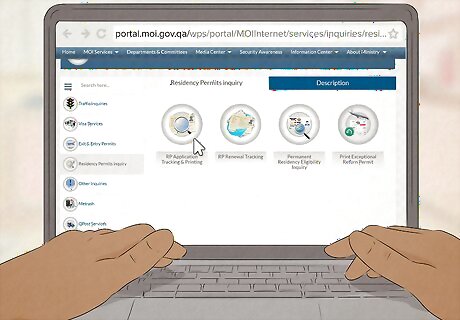
Check your application status at the Ministry of Interior website. From the main page of the website, click on "Inquiries," then "Resident Services," then "Permanent Residence," then "Application Tracking." Provide the required information to pull up information about your application. The Qatari government plans to grant no more than 100 permanent residencies a year, so it could take some time for your application to be approved. When your application is approved, pay an additional fee of QR 3000 to have your permanent resident card issued.
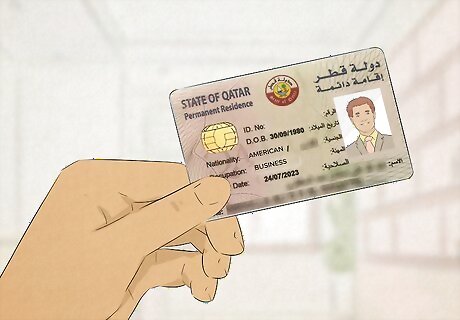
Use your permanent resident card to access government benefits. Permanent residency provides greater benefits than simply not having to renew your work permit every year. Once you're a permanent resident, you and your family can receive free government health and education services. You also have the power to invest in the Qatari economy and own Qatari real estate. If you're granted permanent residency, your spouse and dependent children will be granted permanent residency as well and have access to the same government benefits. Even as a permanent resident, you still aren't eligible for some of the benefits, such as government pensions, that are only available to citizens.
Requesting Citizenship

Live in Qatar legally for at least 25 years. Qatari law requires continuous residence in the country. While you can leave, you can't be out of the country for more than 60 days in any given year. If you apply for permanent residence first, you only have to live in the country for another 5 years before you can request citizenship. However, it could take several years for citizenship to be granted.

Maintain a steady job in Qatar while living there. Your legal status in Qatar is dependent on employment. To become a citizen, you must show that you're capable of supporting yourself and your family and have dependable employment. Qatar doesn't publish the exact amount of money you need to make to be eligible for citizenship, but you should be able to comfortably support yourself and your family and have no trouble paying your bills. Your debts might also be taken into account when you request citizenship, so don't borrow any more money than you have to, and be careful about credit cards.

Learn to read, write, and speak in Arabic. While the law doesn't specify how well you need to know Arabic if you want to request citizenship, it's safe to assume that you have to be near-fluent. The Qatari government would likely expect you to be as proficient in Arabic as any other Qatari citizen. Even though English is commonly spoken in Qatar as a second language, after 25 years in the country, you likely won't have any problems with this requirement.

Convert to Islam if you aren't already Muslim. While it isn't specifically listed in Qatari nationality law as a requirement, Qatar is an Islamic state, and almost all of its citizens are Muslim. If you aren't Muslim, converting will likely be beneficial for you when you request citizenship. Generally, it's best to do this soon after you enter the country, rather than waiting until you're eligible for citizenship to convert. This gives you plenty of time to demonstrate your belief and devotion to Islam. Islam is also the state religion of Qatar. If you're neither a Muslim nor a member of one of the 8 Christian denominations registered in the state, a grant of citizenship is unlikely.

Discuss citizenship with staff at the Ministry of Interior. Although the law lays out how a foreign national might become eligible for Qatari citizenship, the government doesn't have any specific procedure you can follow or form you can fill out to become a citizen. Presumably, the best you could do would be to let the Ministry of Interior know your intentions and go from there. It helps if you're a well-known person who enhances the reputation and prestige of Qatar in some way. The Emir will likely have to approve your application, and he'll be more likely to do so if he recognizes your name and knows who you are. Keep in mind that out of the millions of foreign nationals living and working in the country, Qatari law limits citizenship grants to no more than 50 per year. While it's not known precisely how many foreign nationals have been granted Qatari citizenship, most of them are likely world-class athletes recruited to represent Qatar in global competitions, such as the Olympics.












Comments
0 comment